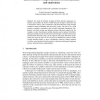Free Online Productivity Tools
i2Speak
i2Symbol
i2OCR
iTex2Img
iWeb2Print
iWeb2Shot
i2Type
iPdf2Split
iPdf2Merge
i2Bopomofo
i2Arabic
i2Style
i2Image
i2PDF
iLatex2Rtf
Sci2ools
105
Voted
FOSSACS
2010
Springer
2010
Springer
Block Structure vs. Scope Extrusion: Between Innocence and Omniscience
Abstract. We study the semantic meaning of block structure using game semantics and introduce the notion of block-innocent strategies, which turns out to characterise call-by-value computation with block-allocated storage through soundness, finitary definability and universality results. This puts us in a good position to conduct a comparative study of purely functional computation, computation with block storage and dynamic memory allocation respectively. For example, we show that dynamic variable allocation can be replaced with blockallocated variables exactly when the term involved (open or closed) is of base type and that block-allocated storage can be replaced with purely functional computation when types of order two are involved. To illustrate the restrictive nature of block structure further, we prove a decidability result for a finitary fragment of call-by-value Idealized Algol for which it is known that allowing for dynamic memory allocation leads to undecidability.
Applied Computing | Block Structure | Dynamic Memory Allocation | FOSSACS 2010 | Functional Computation |
| Added | 28 May 2010 |
| Updated | 28 May 2010 |
| Type | Conference |
| Year | 2010 |
| Where | FOSSACS |
| Authors | Andrzej S. Murawski, Nikos Tzevelekos |
Comments (0)

